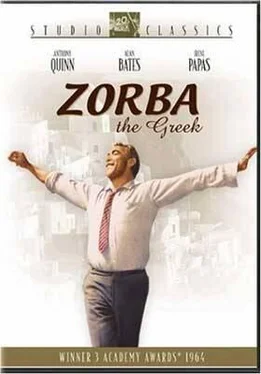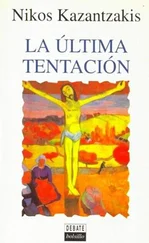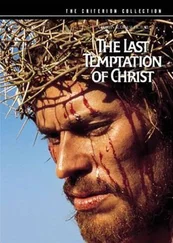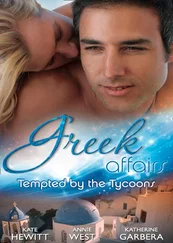Nikos Kazantzakis - Zorba The Greek
Здесь есть возможность читать онлайн «Nikos Kazantzakis - Zorba The Greek» весь текст электронной книги совершенно бесплатно (целиком полную версию без сокращений). В некоторых случаях можно слушать аудио, скачать через торрент в формате fb2 и присутствует краткое содержание. Жанр: Современная проза, на английском языке. Описание произведения, (предисловие) а так же отзывы посетителей доступны на портале библиотеки ЛибКат.
- Название:Zorba The Greek
- Автор:
- Жанр:
- Год:неизвестен
- ISBN:нет данных
- Рейтинг книги:3 / 5. Голосов: 1
-
Избранное:Добавить в избранное
- Отзывы:
-
Ваша оценка:
- 60
- 1
- 2
- 3
- 4
- 5
Zorba The Greek: краткое содержание, описание и аннотация
Предлагаем к чтению аннотацию, описание, краткое содержание или предисловие (зависит от того, что написал сам автор книги «Zorba The Greek»). Если вы не нашли необходимую информацию о книге — напишите в комментариях, мы постараемся отыскать её.
Zorba The Greek — читать онлайн бесплатно полную книгу (весь текст) целиком
Ниже представлен текст книги, разбитый по страницам. Система сохранения места последней прочитанной страницы, позволяет с удобством читать онлайн бесплатно книгу «Zorba The Greek», без необходимости каждый раз заново искать на чём Вы остановились. Поставьте закладку, и сможете в любой момент перейти на страницу, на которой закончили чтение.
Интервал:
Закладка:
"Kyrie eleison! Kyrie eleison!" murmured the villagers in terror.
"That's not all," added the monk, swallowing his spittle. "When we bent down to lift up the accursed Zaharia we stood aghast: for the Virgin had shaved off his hair, moustache and beard-like a Catholic priest!"
Controlling my laughter with the greatest difficulty, I turned to Zorba.
"Scoundrel!" I said in a low voice.
But he was watching the monk, his eyes wide open in surprise, and was crossing himself with deep emotion all the time, to show his utter amazement.
"You are great, O Lord! You are great, O Lord! And your works are wonderful!" he murmured.
At this moment the other monks arrived and dismounted. The hospitaller held the icon in his arms; he climbed up a rock, and all rushed and scrambled to prostrate themselves before the miraculous Virgin. Last came the fat Demetrios, carrying a plate, making the collection and sprinkling the peasants' hard heads with rose water. Three monks stood round him chanting hymns, with their hands folded together over their stomachs, their faces covered with great beads of sweat.
"We are going to take her in procession round the villages of Crete," said the fat Demetrios, "so that the believers can kneel to Her Holiness and bring their offerings. We need money, lots of money, to restore the holy monastery…"
"The fat hogs!" grumbled Zorba. "They're even going to make something out of this!"
He went up to the abbot.
"Holy father, everything is ready for the ceremony. May the Holy Virgin bless our work!"
The sun was already high, it was very hot, and there was not a breath of wind. The monks placed themselves round the pylon bearing the flag. They wiped their foreheads with their broad sleeves and began chanting the prayer for "the foundations of buildings."
"Lord, O Lord, found this contrivance on solid rock that neither wind nor water may shake it…" They dipped the aspergillum in the copper bowl and sprinkled objects and people-the pylon, the cable, the pulleys, Zorba and me, and, finally, the peasants, workmen and the sea itself.
Then, with great care, as if they were handling a sick woman, they lifted the icon, set it close to the parrot, and surrounded it. On the other side were the elders, in the center Zorba. I myself had withdrawn slightly towards the sea and was waiting.
The line was to be given a trial with three trees: a holy trinity. Nevertheless a fourth was added as a sign of recognition towards the Holy Virgin of Revenge.
Monks, villagers, and workmen crossed themselves.
"In the name of the Holy Trinity and the Holy Virgin!" they murmured.
In a single bound Zorba was at the first pylon, pulled the cord and down came the flag. It was the signal for which the men at the top of the mountain had been waiting. All the spectators stepped back and looked towards the summit.
"In the name of the Father!" cried the abbot.
Impossible to describe what happened then. The catastrophe burst upon us like a thunderbolt. We had scarcely time to run away. The entire structure swayed. The pine tree, which the workmen had attached to the cable, assumed a demoniac impetus. Sparks flew, large splinters of wood shot through the air, and when the tree arrived at the bottom a few seconds later it was no more than a charred log.
Zorba gave me a hang-dog look. The monks and villagers retreated prudently and the tethered mules began rearing. Big Demetrios collapsed, panting.
"Lord have mercy on me!" he murmured, terror-stricken.
Zorba raised his hand.
"It's nothing," he said with assurance. "It's always the same with the first trunk. Now the machine will be run in… Look!"
He sent the flag up, gave the signal again, and then ran away.
"And the Son!" cried the abbot in a rather trembling voice.
The second tree trunk was released. The pylons shivered, the trunk gained speed, leaping about like a porpoise, and rushed headlong towards us. But it did not get far, it was pulverized half-way down the slope.
"The devil take it!" muttered Zorba, biting into his moustache. "The blasted slope isn't right yet!"
He leaped to the pylon and signalled with the flag once more, furiously, for the third attempt. The monks were by now standing behind their mules, and they crossed themselves. The village worthies waited with one foot raised, ready to take flight.
"And the Holy Ghost!" the abbot stammered, holding up his robe in readiness.
The third tree trunk was enormous. It had hardly been released from the summit when a tremendous noise was heard.
"Lie flat, for God's sake!" shouted Zorba, as he scurried away.
The monks threw themselves to the ground and the villagers ran away as fast as their legs would carry them.
The trunk made one leap, fell back on the cable, threw out a shower of sparks and, before we could see what was happening, sped down the mountainside, over the beach and dived far into the sea, throwing up a great spout of foam.
The pylons were vibrating in a most terrifying fashion, several of them were leaning over already. The mules broke their tethers and ran off.
"That's nothing! Nothing to worry about!" cried Zorba, beside himself. "Now the machine's really run in, so we can make a proper start!"
He sent the flag up once again. We felt how desperate he was, and anxious to see the end of it all.
"And the Holy Virgin of Revenge!" stammered out the abbot as he raced towards the rocks.
The fourth trunk was released. A tremendous splintering noise resounded twice through the air and all the pylons fell down, one after the other, like a pack of cards.
"Kyrie eleison! Kyrie eleison!" yelped the villagers, workmen and monks, as they stampeded.
A flying splinter wounded Demetrios in the thigh and another was within a hair's breadth of taking out the abbot's eye. The villagers had disappeared. The Virgin alone was erect on her rock, lance in hand, looking at the men below with a cold and severe eye. Next to her, more dead than alive, was a trembling parrot, his green feathers standing out from his body.
The monks seized the Virgin, clasped her in their arms, helped up Demetrios, who was groaning with pain, collected their mules together, mounted them and beat a retreat. Scared to death, the workmen who had been turning the spit had abandoned the sheep and the meat was beginning to burn.
"The sheep will be burnt to a cinder!" shouted Zorba anxiously, as he ran to the spit.
I sat down beside him. There was no one else left on the beach, we were quite alone. He turned to me and cast me a dubious, hesitant glance. He did not know how I was going to take the catastrophe, or how this adventure was likely to end.
He took a knife, bent over the sheep once more, tasted it and immediately took the beast off the fire and stood it up on the spit against a tree.
"Just right," he said, "just right, boss! Would you like a piece, as well?"
"Bring the bread and the wine, too," I said. "I'm hungry."
Zorba hurried to the barrel, rolled it close to the sheep, brought a loaf of white bread and two glasses. We each took a knife, carved off two slices of meat, cut some bread and began to eat.
"See how good it is, boss? It melts in your mouth! Here there are no rich pastures, the animals eat dry grass all the time, that's why their meat's so tasty. I can only remember once in my life eating meat as succulent as this. It was that time I embroidered the Saint Sophia with some of my hair and wore it as a charm… an old story…"
"Go on, tell me!"
"An old story, I tell you, boss! A crazy Greek's idea!"
"Go on, Zorba, I'd like to hear you spin the yarn."
"Well, it was like this. The Bulgars had surrounded us, it was evening, we could see them all round us lighting fires on the slopes of the mountains. To frighten us they'd start banging cymbals and howling like a lot of wolves. There must have been a good three hundred of 'em. We were twenty-eight, and Rouvas was our chief-God save his soul if he's dead, he was a fine fellow! 'Come on, Zorba,' he said, 'put the sheep on the spit!' 'It's much more tasty cooked in a hole in the ground, captain,' I said. 'Do it any way you like, but get on with it, we're ravenous,' he said. So we dug a hole, stuffed the sheep in it, piled a layer of coal on top and lit it; then we took the bread from our packs and sat down round the fire. 'It may well be the last one we eat!' said our chief. 'Any of you got cold feet?' We all laughed. No one deigned to answer him. We took our gourds and said: 'Your health, chief. They'd better be good shots if they want to hit us!' We drank, drank again, then pulled the sheep out of the hole. Oh, boss, what mutton! When I think of it my mouth still waters! It melted, like loukoum! We all sank our teeth in it without delay. 'I've never had tastier meat in my life!' said the chief. 'God save us all!' And though he'd never drunk before, he quaffed his glass of wine in one go. 'Sing a Klepht song!' he commanded. 'Those chaps over there are howling like wolves: we'll sing like men. Let's begin with Old Dimos.' We drank up quickly, filled and drank again. Then we started the song. It grew louder and louder, resounding and echoing through the ravines: And I've been a Klepht brigand for forty years, boys!… We sang loud and with a will. 'Well, God help us!' said the captain. That's the spirit! Now, Alexis, look at the sheep's back there… What does it say?' I bent over the fire and began scraping the sheep's back with my knife.
Читать дальшеИнтервал:
Закладка:
Похожие книги на «Zorba The Greek»
Представляем Вашему вниманию похожие книги на «Zorba The Greek» списком для выбора. Мы отобрали схожую по названию и смыслу литературу в надежде предоставить читателям больше вариантов отыскать новые, интересные, ещё непрочитанные произведения.
Обсуждение, отзывы о книге «Zorba The Greek» и просто собственные мнения читателей. Оставьте ваши комментарии, напишите, что Вы думаете о произведении, его смысле или главных героях. Укажите что конкретно понравилось, а что нет, и почему Вы так считаете.












